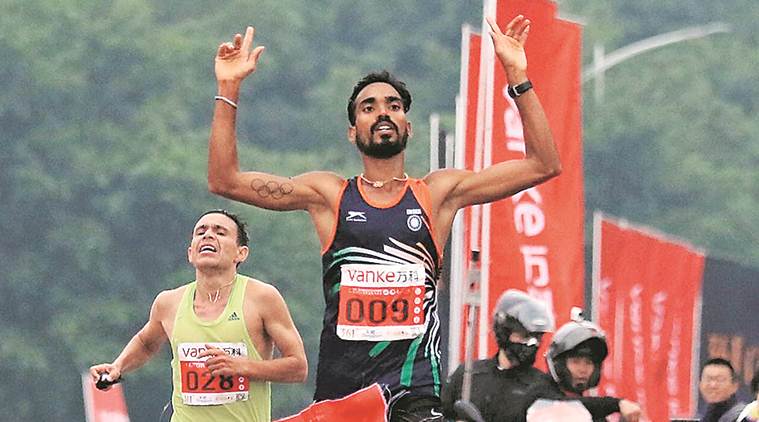
Braving Seoul’s freezing cold, Thonakal Gopi says he was finding it tough to get out of his bed on the day he clocked the second fastest time in the marathon by an Indian. “It was ‘minus’,” says the 30-year-old from Sultan Bathery in north Kerala. On March 17, the day he timed 2:13.39 to qualify for the World Championships, the temperature in the South Korean capital ranged from 2 to 15 degrees. But in tropical Sultan Bathery, anything below 15 degrees is called “minus”.
“It was unusually warm in Bangalore where I was training. As marathoners, we have to travel around the world and compete. But frankly, I have never experienced such cold during a race. I wore arm-sleeves and gloves when I started the race. Believe me, it was freezing. It was the first time I raced in gloves,” Gopi said.
The first 10 kilometres was hell. He started feeling discomfort in both feet because of the cold. However, he managed to record the second fastest time ever by an Indian, and wasn’t too far from Shivnath Singh’s time of 2:12.00 set in 1978.
In Seoul, Gopi was up against more than just the elements and a field of Ethiopian and Kenyans. The Seoul Marathon was the first time Gopi had travelled abroad on his own for a race; no coach, no physio, no pace-setter, no fellow Indian runner.
Being self-reliant is not new to Gopi. For nearly a year, he has been training without a coach after his name was struck out from the list of national campers.
Visa-related issues only added to his woes. A fortnight earlier, he couldn’t travel for the Tokyo Marathon, an event he had trained for and set his sights on for breaking the national record, because the visa didn’t come on time. Missing the race in Japan disrupted his training schedule.
“For one week after knowing that I hadn’t got the visa, I was mentally disturbed. I didn’t train. In the last 10 days before a marathon, we cut down on our ‘mileage’. If a marathoner does 180 to 190 kilometers a week during peak training, in the last week to 10 days it comes down to about 50 to 60 kilometres. So there was not much time for me to get back to full shape. I had just one workout of 30 kilometers after I missed Tokyo and before Seoul,” Gopi said.
Travelling alone to Seoul meant Gopi had to take care of the pre-race nitty-gritties, matters which a coach usually looks after while the athlete rests before the race. “Stuff like preparing my personal drinks and handing it over to race organisers, collecting my chest number… if there is someone with you, it becomes easier. It can happen that when you have a scheduled time for rest, it clashes with the time when chest numbers are distributed. These are small things but can make a difference,” Gopi said.
By now, he has got used to fending for himself. After failing to meet qualification times for last year’s Asian Games, he has been without a coach and training without support staff.
Gopi, an Asian Marathon Champion from 2017, knocked on the doors of the Athletics Federation of India asking them to send his entry. The gold at the Asiad went at 2:18.22, which was within Gopi’s range.
“At the New Delhi Marathon last year, I had clocked 2:15.16. I was disappointed that I could not participate at the Asian Games because I could have won a medal. I saw the timing of the podium finishers and was crushed. But as I didn’t meet the qualifying timings, I guess I should not talk or complain. Fair enough.”
Struggle of a non-camper
From being an elite athlete, Gopi was relegated to a ‘non-camper’. He could train at the Sports Authority of India track at Kengeri, on the outskirts of Bangalore, but could not stay at the hostel.
So he took a room on rent nearby. From being served meals on time at the athletes’ mess, Gopi had to start buying groceries and cooking. He had to fix appointments with private physios and masseurs and find time between training sessions to travel through traffic to consult them.
“Brown rice, boiled vegetables, mutton, sweet potato. This is basically my diet. I have four eggs a day and non-vegetarian meals three times a week. Carbohydrates are important for marathon runners, so I had to get my diet chart right. Once you are removed from the national camp, you have to take care of everything on your own.”
Things are looking up since he qualified for the World Championships. On Wednesday, Gopi was packing his bags and preparing to join the national camp in Ooty.
“My aim has been to break the national record, which is the oldest in India. I feel that I could have done it in Tokyo because my preparation was perfect. In Seoul, my right calf muscle did cramp a bit with five kilometres to go. I have regained my confidence now as I have improved my personal best.”
The marathon at the Doha World Championships will begin at midnight to protect the runners from peak summer temperatures.
It will be a challenge for the athletes to adjust their body clock for a 12 am start on a fully lit-up race course.
“I have never participated in a race that starts at midnight. There are a few unknowns. But I am ready for it. Maybe the track will be fast… maybe a national record…”